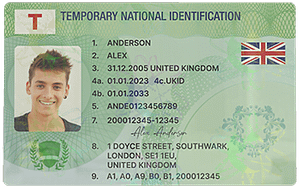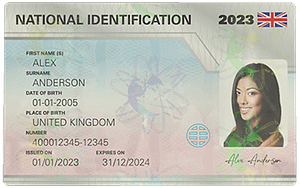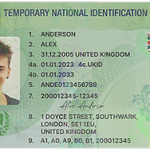The rental housing market is a crucial part of the real – estate sector, providing accommodation solutions for countless individuals and families. However, the presence of fake ID cards poses significant challenges and impacts on this market, which need to be carefully examined.
Security Risks in Tenant Screening
One of the most immediate impacts of fake ID cards in the rental housing market is on tenant screening. Landlords rely on the identification documents provided by potential tenants to verify their identity, background, and legal status. When fake ID cards are used, it becomes extremely difficult to accurately assess the true nature of the tenant. For example, a tenant using a fake ID might have a criminal record that would otherwise disqualify them from renting a property. If the landlord is deceived by the fake ID, they may unknowingly rent to a person who could pose a security risk to the property and other residents in the building. This could lead to incidents such as theft, vandalism, or even more serious criminal activities within the rental property.

In addition, fake ID – using tenants may also be more likely to engage in illegal sub – letting. They can use the false identity to rent a property and then sub – let it to others without the landlord’s knowledge or permission. This not only violates the terms of the lease agreement but also creates a complex situation where the actual occupants of the property are not properly accounted for, further increasing security risks.
Legal and Regulatory Complications
The use of fake ID cards in the rental housing market also brings about legal and regulatory complications. Landlords have a legal obligation to ensure that they are renting to individuals who are legally eligible to rent property in a particular area. When fake ID cards are involved, landlords may unknowingly violate these regulations. For instance, in some regions, there are restrictions on renting to non – citizens or individuals with certain immigration statuses. If a tenant uses a fake ID to conceal their true immigration status, the landlord could be held liable for renting to an ineligible person.

Furthermore, in the event of a dispute or legal issue related to the rental property, the presence of a fake ID can complicate the legal process. It becomes difficult to establish the true identity of the tenant, which may delay or even derail legal proceedings. For example, if the tenant defaults on rent payments or causes damage to the property, the landlord may face challenges in pursuing legal action against a person whose identity is based on a false document.
Financial Losses for Landlords
Fake ID – using tenants can cause significant financial losses for landlords. As mentioned earlier, they may be more likely to engage in activities that violate the lease agreement, such as illegal sub – letting or causing damage to the property. When a tenant sub – lets illegally, the landlord may lose out on potential rental income from legitimate tenants. Additionally, if the property is damaged by a tenant using a fake ID, the landlord will have to bear the cost of repairs, which can be substantial depending on the extent of the damage.

There is also the risk of non – payment of rent. A tenant using a fake ID may be more likely to default on rent payments as they may have less incentive to maintain a good rental record. Since their identity is false, it becomes harder for the landlord to track them down and recover the unpaid rent, resulting in financial losses for the landlord.
Impact on the Reputation of the Rental Housing Market
The prevalence of fake ID cards in the rental housing market can also have a negative impact on its overall reputation. When word spreads that there are cases of fake ID – using tenants causing problems in rental properties, it can deter potential renters and investors. Renters may become more hesitant to enter the market, fearing that they may end up in a property with unreliable or dangerous neighbors. This can lead to a decrease in demand for rental properties in certain areas, which in turn can affect property values and rental prices.
For investors, the presence of fake ID – related issues may make them think twice before investing in rental properties. They may be concerned about the potential legal and financial risks associated with such problems, and this could lead to a slowdown in investment in the rental housing sector, which has broader implications for the real – estate market as a whole.
Common Problems and Solutions
- Problem: Difficulty in Identifying Fake ID Cards
Solution: Landlords should be trained in basic ID – verification techniques. This can include learning about the security features of different types of identification documents, such as holograms, watermarks, and special inks. They can also invest in ID – verification tools like document scanners that can detect some common signs of fake IDs. Additionally, landlords can cross – reference the information on the ID card with other sources, such as government databases (if legally possible), to verify the authenticity of the tenant’s identity. - Problem: Lack of Awareness Among Landlords
Solution: Industry associations and local government bodies should conduct awareness – raising campaigns for landlords. These campaigns can educate landlords about the risks associated with fake ID cards in the rental housing market and provide them with practical tips on how to prevent and deal with such situations. Workshops and online resources can be made available to help landlords stay informed and prepared. - Problem: Inadequate Legal Support for Landlords
Solution: Governments should review and strengthen the legal framework related to rental housing and fake ID issues. This can include providing clear guidelines on how landlords should handle suspected cases of fake ID use, and what legal remedies are available to them. There should also be a streamlined process for landlords to report and deal with fake ID – related problems, ensuring that they are not left in a vulnerable position when facing such issues. - Problem: Collusion Between Fake ID Providers and Tenants
Solution: Law enforcement agencies should crack down on the illegal production and distribution of fake ID cards. By targeting the source of the problem, the prevalence of fake ID use in the rental housing market can be reduced. Additionally, landlords can implement more comprehensive tenant – screening procedures that include background checks, employment verification, and references from previous landlords. This can make it more difficult for tenants with fake IDs to pass the screening process. - Problem: Technological Gaps in ID Verification
Solution: The real – estate industry should invest in more advanced ID – verification technologies. This can include biometric verification methods such as fingerprint or facial recognition, which are more difficult to fake. Additionally, the development of blockchain – based identity verification systems can provide a more secure and reliable way to verify tenant identities, reducing the risk of fake ID use in the rental housing market.


